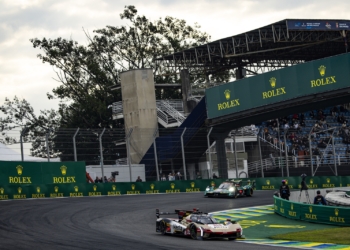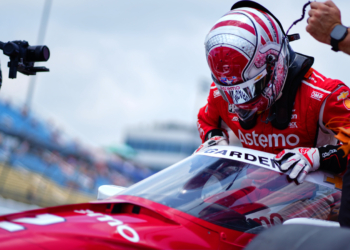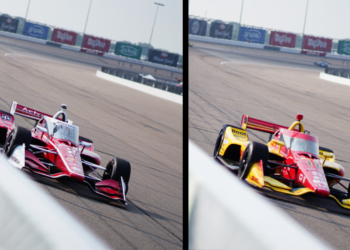Ferrari entered 2019 riding the crest of a confidence wave, after its 2017/18 progress, believing that its SF90 was the car to end a decade wait for a championship. But pre-season optimism soon collapsed as reality set in and its title-less fate, long sealed before Japan, was officially sealed. Motorsport Week takes a look at the key areas where Ferrari needs to improve if it is to mount a sustained and credible 2020 bid.
Reliability
One of Ferrari’s primary strengths through 2019 has been its power output, with the team now the benchmark, a world away from its desperately embarrassing delivery of the hybrid era’s early years. It has surpassed Mercedes in this department even if the different car concepts mean that its opponent’s draggier approach has compromised its straight-line speed. Nonetheless, Ferrari has had more than one costly reliability blunder, and in a year when Mercedes has been faultless – the Silver Arrows have not faced a single qualifying or race-defining setback – any slip-up will be costly. During the second pre-season test in Barcelona the SF90's running was halted and delayed by gremlins, prompting team boss Mattia Binotto to regard reliability as something of a concern. Such worries have come to fruition on occasion. Charles Leclerc’s cylinder failure in Bahrain and the power issue that halted Sebastian Vettel in Russia robbed Ferrari of two certain victories. Setbacks also occurred during qualifying in Austria (for Vettel, leaving him P10) and, more agonisingly, for both drivers in Germany, leaving Leclerc P10 and Vettel at the back, having set the pace through practice. Given Mercedes’ supreme reliability, Ferrari too must strive to be utterly immaculate. It was a strength in 2018, but it has dipped slightly in 2019.
.jpg)
Driver mistakes
No person in any industry is immune to a mistake, particularly in an environment where the boundaries are being pushed, but Ferrari’s drivers have again made too many blunders. For Vettel 2019 has been a disappointing continuation of the end of 2018. In Bahrain his spin while racing Hamilton cost him a podium, and likely win given Leclerc’s subsequent failure, and in Canada his wide moment under pressure gifted Hamilton the victory – albeit controversially. More costly points-wise was his crash with Verstappen in Britain and his lone spin in Italy, the latter a humiliating setback amid Leclerc’s triumph. For a driver of his inexperience mistakes were to have been expected from Leclerc and he too has been culpable. A Q2 crash wrecked his win prospects in Azerbaijan, while in Monaco his aggression was excessive and he paid the price, with Ferrari none too happy at his floor-shredding antics as he returned to the pits at too high a speed. Germany blunder denied him a shot at the win, having already had one warning at that corner while slow start and clumsy clash with Verstappen in Japan ruined a podium opportunity. At almost half of the grands prix a driver mistake has limited Ferrari’s chances.
.jpg)
Driver tension
This has not yet boiled over to a point where the Ferrari drivers have collided, nor has it yet cost them in any serious manner, but it has the capacity to go horribly wrong. The erudite Binotto has asserted that having two drivers of such high quality is a luxury but the pure nub of the matter is that, at some stage, it will boil over. It always does between two top drivers. Bahrain was a flashpoint, while tension arose in Italy – amid the qualifying saga for which Leclerc was given a slap on the wrist – Singapore and Russia. It will not have escaped the astute observer that such situations occurred at events where Ferrari was at its most competitive. Moving forward Binotto has a delicate balance to strike at every single turn to ensure that there is no perception of favouritism – assuming, that is, neither Vettel nor Leclerc enters 2020 as the designated team leader. The most famous team-mate collapses have often taken place at emphatically dominant squads (see: Prost/Senna, Hamilton/Rosberg) but there have been instances of such animosity costing a team a Drivers’ title to an opponent with a designated leader (see: Williams to Prost in 1986, McLaren to Raikkonen in 2007). Assuming Mercedes and Ferrari are on par in 2020, or even if one has a slight edge, then Ferrari has to carefully manage the Vettel-Leclerc partnership to assume it extracts the best from both drivers without compromising the team.
.jpg)
Car development
Ferrari has kicked on strongly since Formula 1’s summer break as aerodynamic parts delivered to the SF90 have addressed some of the balance issues that previously hampered prospects. The car has not quite been transformed but it has been a far more competitive package, with Sebastian Vettel in particular enthused by the gains, while its 1-2 lockout in Japan was certainly eye-catching. But at the start of the year Ferrari – which adopted a different concept to Mercedes – was left behind after a strong opening in testing. It lagged behind Mercedes in Australia, and was also substantially adrift at downforce-dependent venues such as Barcelona, Paul Ricard and Budapest. It also struggled for tyre performance as a knock-on effect, falling a whole minute behind in the 70-lap Hungarian encounter. Ferrari has already committed to the same car concept for 2020 and the encouraging aspect is that parts brought recently have worked. In some ways 2019 has been a reverse of 2017 and 2018, when early promise and optimism went to waste. It must therefore not only start 2020 on a stronger footing – and not be left playing catch-up – but string together a year-long challenge, something it has not done for almost a decade.
.jpg)
Anything else?
Ferrari has failed to achieve its 2019 goals but there remains a lot for the team to be optimistic about moving forwards. Under Binotto a calmer and more open atmosphere has been fostered – particularly in its relationship with the media – while it has already applied lessons learned. It has rebounded well from a difficult first half of 2019, when it could have capitulated, and ended its nine-year barren spell on home soil. Strategically it has been stronger, albeit there have still been unnecessary losses, such as the decision to leave Leclerc in the garage in Q1. It would be grossly foolish to write-off Vettel’s prospects – he is still only 32 – as for much of 2019 he has not appeared happy with the SF90. The pre-season buoyancy was lost, he strived fruitlessly for months to unearth the feeling he had, but the recent upgrades provided hope, as he started to click with the car. Get Vettel a car with which he can exploit his style and 2020 will be much rosier. Elsewhere the promotion of the ever-improving Leclerc has been completely justified, even accounting for the mistakes. Ferrari has a talent for the next decade. He has proven himself beyond doubt this season. Can Ferrari do it in 2020? It has all the tools and know-how to learn from the 2019 mistakes. But will it? Therein lies the tantalising question as it strives to prevent the all-conquering Mercedes powerhouse from making it seven.
.jpg)






